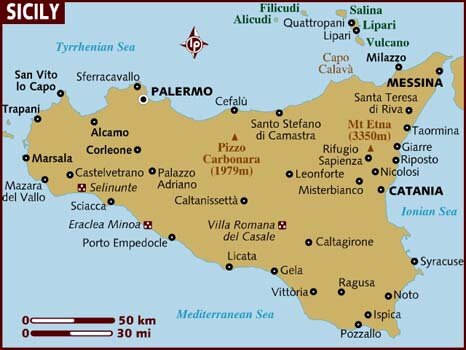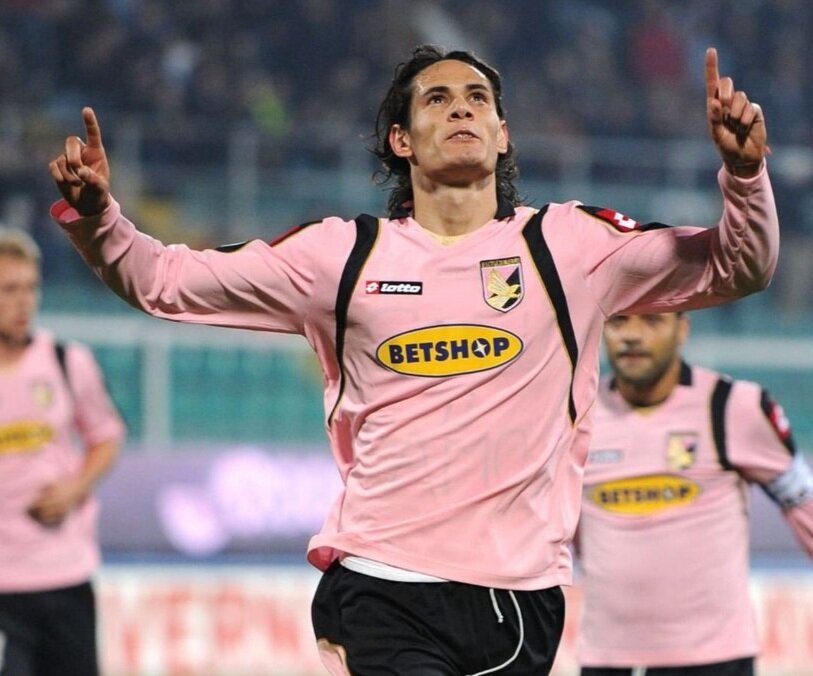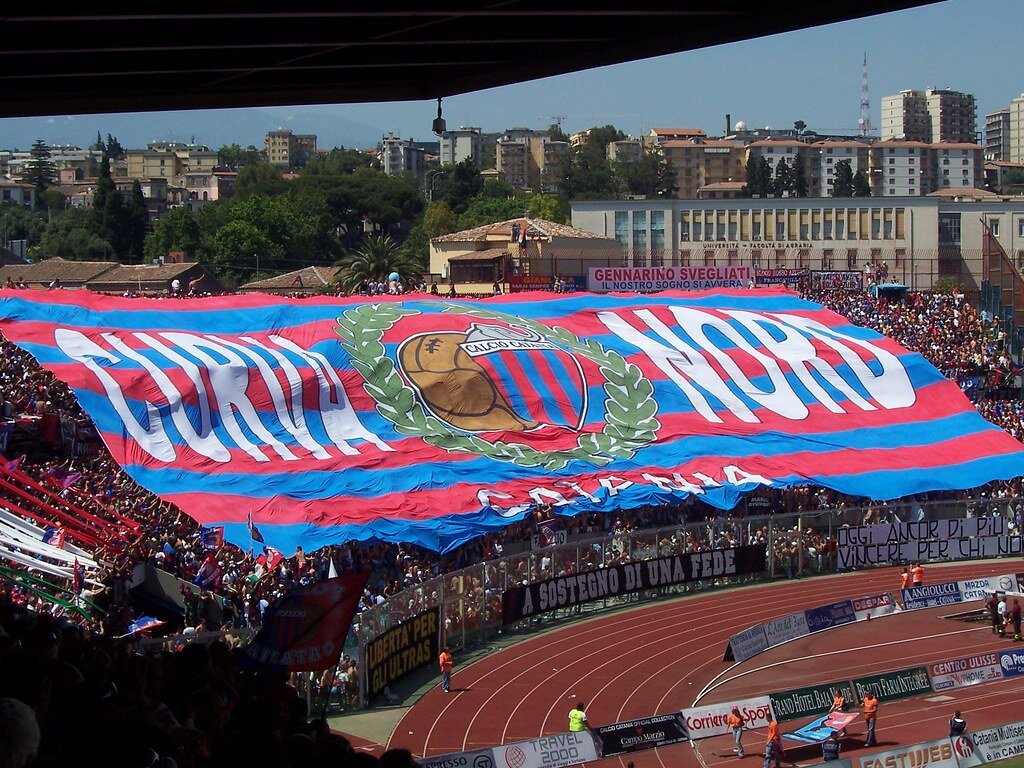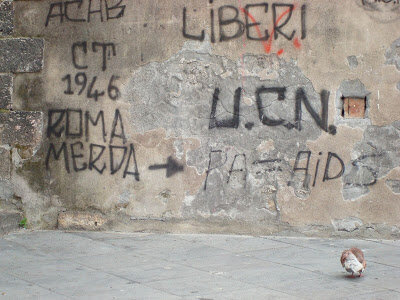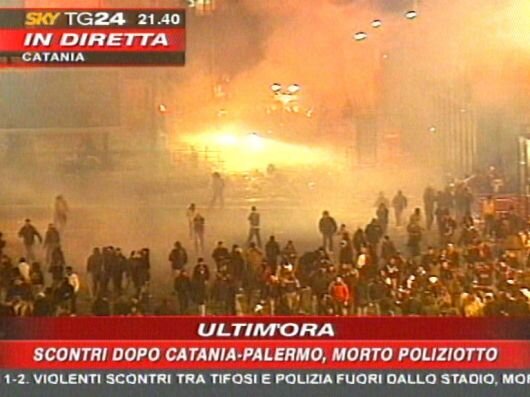The Sicilian Derby | A Tale of Two Cities - Calcio Catania vs SSD Palermo
Usually when talking about rivalries in Italy it is a conversation around the North versus the South. It is a societal issue, greater than just 90 minutes of football. But when specifically talking about football there is extra spice in a SSC Napoli versus AC Milan fixture, for example, as they are two teams in two cities that exemplify the North-South divide.
Derbies of course are intense affairs & any casual football fan will tell you that the Milan derby is one of the biggest derbies in world football and the Rome derby is as intense a rivalry as any other. However down on the island of Sicily there is a derby that is arguably just as big as the other two mentioned and has the ability to get very dark and ugly.
Geography of Sicily
Before we dive into the football & fan aspect of the Sicilian derby, here’s a few geographical, social and demographical points to consider about the two cities.
Palermo & Catania are the two biggest cities on the island, Palermo being the larger & the island’s capital with a population of around 660,000. Catania’s population is roughly half that of Palermo’s. Palermo is located on the north-west coast, with Catania being located on the central-east coast, roughly 200km apart.
On the island there is an invisible line that culturally divides the island into east and west. This imaginary line runs from Santo Stefano on the northern coast, unofficially splitting the island, down to Licata on the southern coast.
Catania is seen as the capital of this imaginary ‘east’, as Palermo is of the ‘west’. Catania is the industrial & commercial hub of the island & the Catanians are stereotyped to be honest & hard-working people. While Palermo is the political & cultural centre of the island, with stronger mafia influence and ties. Palermitans have gained a stereotype of being lazier, more corrupt & more suspicious of outsiders than their Catanian counterparts.
They are the major differences between the two but of course there are far more similarities, primarily an undying love for the island. Many across the island consider themselves Sicilian rather than Italian and there is a deep resentment towards the north of Italy having felt neglected and looked-down upon for centuries. This is reflected in the passion of the football fans of both Calcio Catania and SSD Palermo, and any team travelling down from the mainland for a game can expect a very hostile reception.
Catania v Palermo
The first official league meeting between Catania and Palermo came in 1936, but it was not until the 1961/62 season that they played their first Serie A fixture. In truth the vast majority of recorded derbies have been played in Serie B and C, which is most likely why this derby is not as famous as those in Milan and Rome. Palermo have a superior head-to-head overall in Sicilian derbies, but by quite a distance the most common result of the fixture has been a draw.
SSD Palermo also has the upper hand when it comes to European pedigree, having appeared on three occasions in the group stage of the Europa League this century. They also appeared in the final of the Copa Italia in 2011, losing out in the final to Inter. Most clubs in Italy would be considered “selling clubs” to either the larger northern Italian teams or to some other European giants and some household names that played for Palermo in recent times include; Javier Pastore, Paulo Dybala, Salvatore Sirigu & Edinson Cavani.
Cavani scored 32 goals in 101 games for Palermo before being sold to Napoli in 2011 | Photo Credit
So if you are looking for an underdog in this derby it is most likely going to be Catania. They have never even appeared in a Copa Italia final. They have no major European competition experience. They have an all-time best finish in Serie A of 8th. And their list of former players does not compare to Palermo in terms of household names to your average fan.
So as you can see this is a derby between two clubs without illustrious trophy cabinets, operating in a part of the country that has been looked down upon as the scourge of Italian society for years. Ultimately it comes down to pride and passion in the Sicilian derby, being crowned “kings of the island”. And despite having a lot in common, fans of Catania and Palermo really do despise one another.
Sicilian Ultras
The passionate and colourful support of both teams comes primarily from their ultras groups, which both operate in their respective ‘Curva Nords’.
Catania’s famous Curva Nord | Photo Credit
Catania have many smaller ultras groups operating inside the stadium, but the two main groups that have been present for years are the Falange d’Assalto and the Irriducibili. While similarly Palermo have smaller groups that are active in their Curva Nord, but the main groups include Warriors Ultras and Brigate Rosanero. As is the case with many Italian clubs, the football hooligan element of the supporters of both of these clubs is very evident & the Sicilian teams gained a reputation of having some of the most hostile & violent hooligans in the country.
Banter between football fans is commonplace, but have you ever heard of fans wishing a natural disaster to occur which would result in the destruction of an entire city? Scrawled across walls in Palermo can be found the graffiti reading “Forza Etna”, translating to “come on Etna”. This is fans of Palermo willing the famous volcano Mount Etna to erupt and erase the city of Catania, which lies at the foot of the volcano.
While in Catania, some writing on a wall here clearly reads; “PA = AIDS”, with PA being an abbreviation for Palermo.
Things can get very violent when it comes to this derby & this was very evident during a derby in February 2007, which has become known as one of the darkest days for Italian football.
Palermo had beaten Catania 2-1 in Catania and the home supporters did not take the defeat well. Riots ensued outside the stadium after the final whistle which resulted in a policeman, Filippo Raciti, being killed after an assault by some Catania fans. He was initially taken to hospital but died a short while later as a result of trauma to his liver.
Italian football was suspended and Catania did not play another home game at the Stadio Angelo Massimino until the September of that year after Italian football authorities forced upon the club some stadium upgrades to make the policing of games there safer. A Catania fan was later convicted for the killing of Raciti and sentenced to 14 years in prison.
A photo of the news the evening Filippo Raciti was killed | Photo Credit
In 1999 a fan was shot on derby day before a game in Palermo. He survived the ordeal.
In 2002 a bus bringing Palermo fans to Catania for a derby was stoned & destroyed by Catania hooligans upon arrival into the city.
Before a 2001 derby the Palermo matchday kits were stolen from the changing rooms as the players warmed-up on the pitch.
The clubs have a lot in common yes, but make no mistake, Catania and Palermo and their fans hate one another.
Contrasting fortunes due financial mismanagement and dysfunctional ownership of both clubs has starved Italian football of more Sicilian derbies down the years. Demotion and promotion is the common theme for both clubs, presently Catania and Palermo play in Serie C.
But when the fixture is played they are incredibly hostile affairs, ending with the crowning of the “King of the Island”.
Football in Sicily is very traditional, simplistic and has not modernised like a lot of football of today. Both clubs mirror Sicilian society as a whole; the Stadio Angelo Massimino in Catania and the Stadio Renzo Barbera in Palermo are very old-school and a far cry from the glitz and glam of Milan or Turin, but that is what makes this derby so unique and so very Sicilian.

